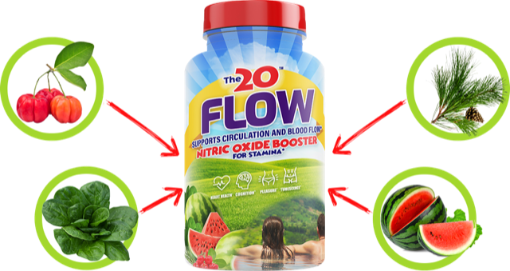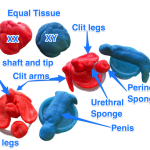I paid for training at the A4M Longevity conference on Nitric Oxide research, where they discussed how it could positively impact longevity. These findings are from the segment by Dr. Nathan Bryan, Ph.D., who calls NO the “Master Hormone.”
This is Dr. Bryan and I. We were both speakers at a conference called How Do You Health.
Based on the research presented, Nitric Oxide has been linked to positively affecting many of our body’s longevity mechanisms. Nitric Oxide is now being presented in the “public square” regarding its attributes for slowing down and potentially even reversing aging.
Three popular theories explain why we age:
- Telomere shortening
- Mitochondrial dysfunction
- Loss of stem cell function and repair
Scroll down to check out how Nitric Oxide plays a role in these aging process theories. If you want to check out our FLOW Nitric Oxide supplement, here’s the link. Our supplement, made from organic fruit and vegetables, is a clean formulation from natural foods. It supports nitric oxide production, especially if you’re not regularly eating beets and leafy greens.
Up To 33% OFF On FLOW ⇐ 3 Bottles Every 3 Months Option (plus FREE Shipping for US-based orders over $50 or International Orders over $75))
FLOW OF YOUTH
Telomere shortening refers to our DNA strands’ protective end-caps, called telomeres, getting shorter over time. Think of telomeres as the plastic tips on shoelaces that keep them from fraying. As the shoelaces get shorter with use, so do the telomeres as cells divide and age.
When telomeres become too short, cells can no longer divide, leading to aging and disease. However, by adopting a healthy lifestyle with good sleep, exercise, and nutrition, we can help maintain healthy telomeres.
Studies have shown that Nitric oxide plays a crucial role in regulating the length of telomeres. It helps control the activity of an enzyme called telomerase, which adds DNA to the ends of telomeres and maintains their length. High nitric oxide levels may lead to increased telomerase activity, preserving telomere length, while low levels result in decreased telomerase activity and shortening.
The second central theory is the mitochondrial theory of aging. It suggests that the cause of aging is the damage to our cells’ energy-producing structures, the mitochondria.
As we age, the mitochondria become less efficient and produce more harmful byproducts, leading to cellular damage and aging.
Nitric oxide regulates mitochondrial health. It increases blood and oxygen flow to cells, supporting healthy mitochondrial function and reducing cellular damage. Low nitric oxide levels can result in decreased mitochondrial function and increased production of harmful byproducts, contributing to aging.
NITRIC OXIDE RESEARCH
Lastly, stem cell theory explains that aging occurs due to the decreased number and function of stem cells in our body.
Stem cells are unique cells that can develop into many different types of cells and repair and regenerate damaged tissues. As we age, the number of stem cells decreases, and their function decreases, making it harder for our bodies to repair and restore. This leads to a decline in tissue and organ function and contributes to aging.
Nitric oxide also plays a role in this theory, regulating stem cell function and promoting cell proliferation. By promoting healthy blood flow and oxygenation, nitric oxide supports stem cell survival and function and signals stem cells to divide and differentiate into new cells.
Low nitric oxide levels may decrease stem cell function and proliferation, contributing to aging and disease.
So… what does this all mean?
Is Nitric Oxide the key to longevity?
More research is needed to obtain conclusive results. However, the initial findings are promising, and many doctors agree we’re heading in the right direction.
Modern research has given us a sneak peek at the potential to fight and reverse aging.
Our FLOW supplement helps your body produce more Nitric Oxide and contains L-Citrulline, which is produced by organic fruits and vegetables. There are also procyanidins from the tannins of pine bark, a class of polyphenols and flavonoids like those found in blueberries, wine, grape skin, citrus, and cocoa. Some research suggests that procyanidins have antioxidant and anti-inflammatory activity. The remaining compounds are phenolic acids, which may also have antioxidant activity. In addition, there is organic spinach powder which provides the nitrates that your body converts to nitrites which your stomach then makes into nitric oxide to store for more blood flow. All of these are naturally derived ingredients.
Up To 33% OFF On FLOW ⇐ 3 Bottles Every 3 Months Option (plus FREE Shipping for US-based orders over $50 or International Orders over $75)
All information from Susan Bratton, Personal Life Media, The20, and our collective brands are personal opinions. The statements made within this email/website have not been evaluated by the Food and Drug Administration. These statements and the products of this company are not intended to diagnose, treat, cure, or prevent any disease. Always seek consultation from your doctor.









